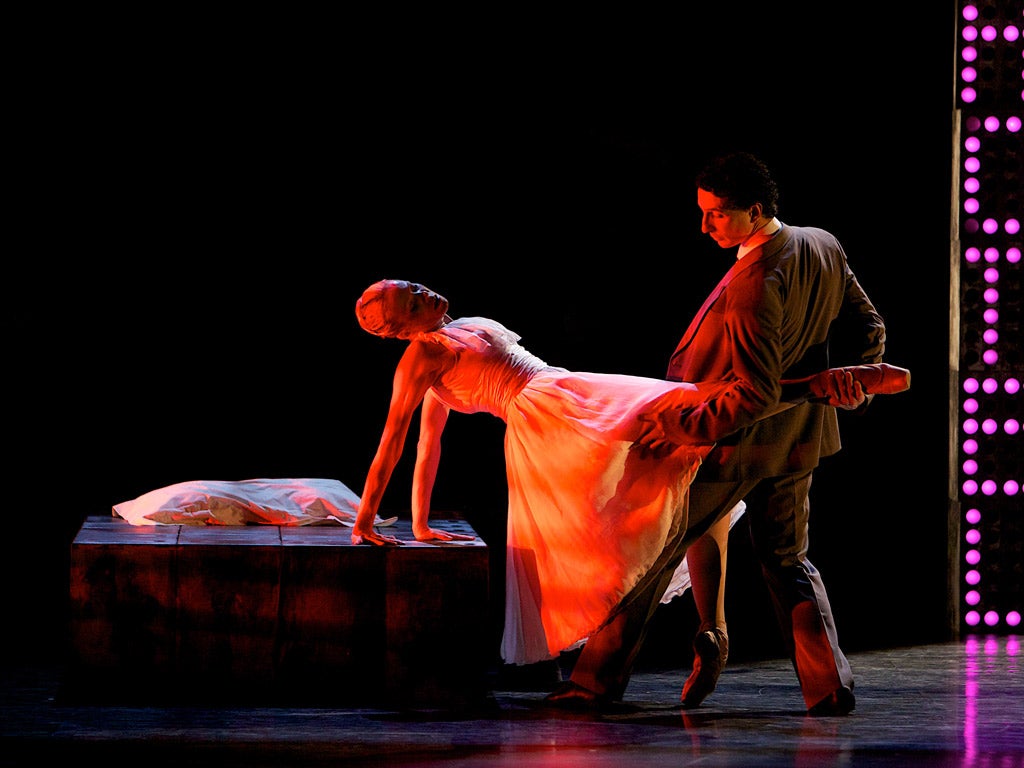A Streetcar Named Desire, Sadler's Wells, London
Tennessee Williams as dance? I do declare! But Scottish Ballet triumphs with a perfectly told tale

Your support helps us to tell the story
From reproductive rights to climate change to Big Tech, The Independent is on the ground when the story is developing. Whether it's investigating the financials of Elon Musk's pro-Trump PAC or producing our latest documentary, 'The A Word', which shines a light on the American women fighting for reproductive rights, we know how important it is to parse out the facts from the messaging.
At such a critical moment in US history, we need reporters on the ground. Your donation allows us to keep sending journalists to speak to both sides of the story.
The Independent is trusted by Americans across the entire political spectrum. And unlike many other quality news outlets, we choose not to lock Americans out of our reporting and analysis with paywalls. We believe quality journalism should be available to everyone, paid for by those who can afford it.
Your support makes all the difference.Impossible is clearly not a word Nancy Meckler chooses to hear. The theatre director who made her name compressing vast, sprawling novels for the stage with the company Shared Experience has now tackled a famously text-heavy play for Scottish Ballet.
Attempting to replicate the experience of Tennessee Williams's A Streetcar Named Desire without recourse to the sweaty New Orleans drawl of its language might seem like trying to open a bottle of bourbon in boxing gloves. But with the collaboration of choreographer Annabelle Lopez Ochoa (a novice to full-length narrative dance despite an impressive list of credits) and composer Peter Salem (originator of the music for TV's Call the Midwife and an aficionado of 1940s jazz), this danced version is thrillingly persuasive.
Not only does it crackle with Southern heat and sexual tension, but it's a model of storytelling. No need to have seen the play or the film: everything is here, from the big themes of masculine-feminine, earth and air, to the smallest detail. Even Blanche DuBois' la-di-da way of speaking finds its way into a mincing step and a ladylike twitch of the skirt. You see the veins stiffen in irritation on her brother-in-law's neck every time she does it.
The boldest move, plot-wise, is to present Blanche's story chronologically, fleshing out the miserable backstory that in the original seeps out drip by drip: the failure of her marriage, the husband's suicide, the crumbling of the family home, Belle Reve, the subsequent search for "the comfort of strangers". Here, the unequivocal treatment of the husband's homosexuality in a man-on-man duet at first seems heavy-handed (and Tennessee Williams was anything but that). But this episode bears fruit strategically when memories of it return to madden Blanche, her dead husband dancing on and accusingly on in a blood-soaked shirt. It's a simple enough device, made dreamlike by Tim Mitchell's sooty lighting, which in turn lends a sticky claustrophobia to Niki Turner's empty set – a wall of grimy apartment windows and dangling bulbs.
That bare space is necessary for dancing in, but it's constantly redefined. Packing crates, stacked and restacked by members of the chorus to create the high-rise of New Orleans, are sat upon to suggest the jostling trolleybus of the title, or rearranged as cinema seats, or a living-room couch. Bare-boards theatre has been doing this sort of thing for 30 years. Amazing that it's taken this long – and Scottish Ballet's outgoing director, Ashley Page – to bring it to dance.
Tennessee Williams had toyed with calling his play The Moth, and this becomes Meckler's key image: the faded, fluttering Southern belle and the harsh bare lightbulb she is so intent on covering with a fancy Japanese shade. How clever of composer Peter Salem to have the popular song "It's Only a Paper Moon" issuing from the wireless when Stanley loses his rag at the disruption to his card game and throws the set out of the window. When there is violence, it feels horribly real.
The score, most of it live from a band in the pit, some of it recorded atmospheric noise, is the chief motor of this Streetcar. Drawing on a range of styles, from polite wedding waltzes to juicy New Orleans jazz to Philip Glass-ish noodling, it doesn't just underpin the action but offers emotional pointers ahead of the game. A blind man would know where he was in the story. The climax, where the "Paper Moon" theme shatters into a pile-up of discordant shards, isn't just a stirring aural metaphor for the chaos in Blanche's head, you can imagine it really is the sound in her head.
Scottish Ballet's principals prove first-rate, with Eve Mutso a mercurial and dangerously sympathetic Blanche, and Tama Barry a believably brutish Stanley, all scowl and pectorals. He even gets to roar "Stella!" like Marlon Brando. Sophie Martin's pregnant Stella is the moral touchstone, sensual and earthed. Her conciliatory duet with Stanley is not only startlingly gymnastic; it's almost certainly the most erotic thing on any stage right now.
His Majesty's, Aberdeen (0845 270 8200) 2-5 May; Eden Court, Inverness (01463 234 234) 9-12 May; Grand Opera House, Belfast (028-9024 0411) 16-19 May.
Next week
Jenny Gilbert signs up for Cuba's Ballet Revolucion
Critic's choice
Breakin' Convention – London's annual three-day festival of hip hop dance theatre – returns in its ninth edition and with an eight-venue tour to follow. A single day-ticket gives access to workshops, DJ demos, free-style sessions and live aerosol art as well as dozens of eye-popping main-stage performances. At Sadler's Wells (Sat to Mon 7 May); then touring till June.
Join our commenting forum
Join thought-provoking conversations, follow other Independent readers and see their replies
Comments